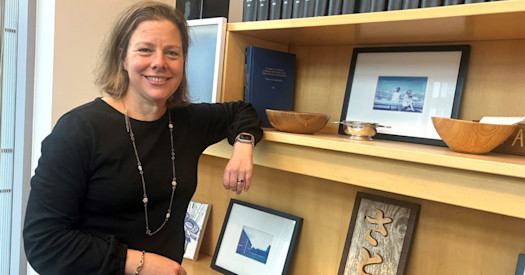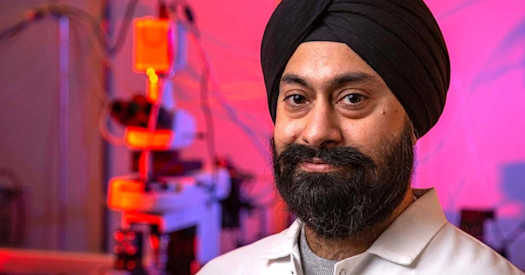 Identifying the precise genetic cause of a disease, especially a rare disease, is as complex as it is demanding. But for many of the estimated 30 million people in the U.S. dealing with one of more than 7,000 rare diseases, the work is essential.
Identifying the precise genetic cause of a disease, especially a rare disease, is as complex as it is demanding. But for many of the estimated 30 million people in the U.S. dealing with one of more than 7,000 rare diseases, the work is essential.
This is because – as an individual or his/her/their family who has an undiagnosed genetic disorder will attest – knowing the name or cause of a disorder is powerful; it provides a reason why and allows the individual or family to connect with others who have the same disorder. In other cases, a diagnosis may suggest novel treatments or provide crucial prognostic information.
Rare diseases are often caused by changes in genes or chromosomes. In some instances, they are passed from one generation to the next, while others, including rare cancers and some autoimmune diseases, are not inherited. Unfortunately, in nearly 50 percent of individuals seen in a genetics clinic who have a suspected genetic disorder, the exact genetic change cannot be identified by current clinical testing.
Dr. Evan Eichler, a professor in the UW Medicine Department of Genome Sciences – working with Dr. Danny Miller and associates at Seattle Children’s Hospital, the Seattle Children’s Research Institute, and the University of Washington – is determined to increase that percentage.
“Despite widespread availability of clinical genetic testing, many individuals with suspected genetic conditions do not have a precise diagnosis,” said Eichler, who is also an investigator of the Howard Hughes Medical Institute. “This limits their opportunity to take advantage of state-of-the-art treatments.”
With $150,000 in funding from a “Catalytic Collaboration Grant” awarded in 2019 by UW Medicine’s Brotman Baty Institute for Precision Medicine (BBI), Eichler and his colleagues performed targeted long-read sequencing (T-LRS) on 33 individuals, analyzing the DNA of patients who had complex genetic changes or lacked a complete genetic diagnosis. The results were impressive:
The effectiveness of T-LRS was validated by detecting known genomic differences. In six of seven patients with complex genetic structural rearrangements, T-LRS enabled more precise resolution of the mutations, which led, for one patient, to changes in clinical management. In nine individuals who lacked precise genetic diagnoses, T-LRS found causal or likely causal variants of rare diseases in five, and variants that might be causal in two others. “The diagnostic utility of T-LRS was affirmed,” said Dr. Irene Chang, an attending physician at Seattle Children’s Hospital and one of the study’s leaders. “T-LRS represents a promising strategy to evaluate individuals with suspected genetic disorders who received complex, non-diagnostic clinical testing results. Its application likely will increase the diagnostic yield of rare disorders, particularly inborn errors of metabolism with pathognomonic biochemical findings, yet elusive, DNA changes.”
That’s good news for the family of one patient being treated by Chang.
That patient suffers from Lesch-Nyhan syndrome, a rare genetic disorder in which patients have neuro-behavioral abnormalities, the manifestations of which include cognitive delay, hyperuricemia (high uric acid levels), dystonia (tensing of various muscles), chorea (jerking movements), and self-injuring behaviors. People with this severe disease need wheelchairs, are unable to walk, and have shortened lifespans. Prevalence of the syndrome is about 1 in 380,000 individuals.
This condition is inherited in an X-linked recessive pattern, meaning typically only males have symptoms. It is caused by mutations in the gene HPRT1, which provides instructions for making an enzyme related to uric acid production, a bodily waste product that is normally excreted in urine. Deficiency of this enzyme leads to overproduction and high levels of uric acid, causing the debilitating condition.
“Working with this patient and family has been an especially rewarding experience for me as a clinician,” Said Dr. Danny Miller, a pediatrics and medical genetics resident at Seattle Children’s Hospital and the University of Washington. “Knowledge is power, and while we are not yet able to cure Lesch-Nyhan, this child’s family now has a greater understanding of the genetic makeup and the reasons behind this condition. I believe that understanding genetic disorders represents the future of clinical research and, in a broader context, the future of precision medicine.”
In addition to Eichler, Miller, and Chang, other BBI members involved in the study include:
Heather Mefford, Center for Pediatric Neurological Disease Research, Department of Cellular and Molecular Biology, St. Jude Children’s Research Hospital James Bennett, a physician at UW Medical Center and co-director of the Seattle Children’s Hospital Molecular Diagnostic Lab Jessica Chong, an assistant professor at UW Medicine’s Department of Pediatrics Michael Bamshad, a professor and chief of the Division of Genetic Medicine with UW Medicine’s Department of Pediatrics Deborah Nickerson, a professor of genome sciences at UW Medicine Tim Cherry, a principal investigator at Seattle Children’s Research Institute’s Center for Developmental Biology and Regenerative Medicine and an assistant professor at the UW School of Medicine in the Department of Pediatrics, Division of Genetic Medicine Dan Doherty, a professor at the Seattle Children’s Hospital Center for Clinical and Translational Research, Center for Integrative Brain Research
Their collaboration led to the development last November of the paper “Targeted long-read sequencing resolves complex structural variants and identifies missing disease-causing variants” on which Miller is the lead author. The paper is available in preprint at bioRxiv.
The authors conclude, “We predict that the eventual implementation of long-read sequencing (LRS) will have a major impact on all aspects of clinical genetic testing, because as a single test LRS has the potential to replace nearly every other genetic test currently offered… Overall, this workflow is likely to increase the diagnostic rate, reduce the cost, and shorten the time to diagnosis for families with rare genetic conditions.”
Eichler noted that in addition to the BBI grant, funding for the study was supported by the Simons Foundation and an R01 grant from the U.S. National Institutes of Health.
“We feel fortunate that the BBI will continue this work for another year as part of a trainee grant to Dr. Miller with a major goal being implementation of a clinical test based on this work,” he said.
[NOTE: The Brotman Baty Institute for Precision Medicine (BBI), in fulfilling its goal to create a community of investigators across its three founding institutions, awards grants each year to advance basic science and translational research related to precision medicine. This is the second in a series of articles featuring outcomes, results, and scientific advances of projects previously funded through the Catalytic Collaborations granting program. The program was launched in 2018 and is now in its third round of funding pilot projects. BBI invites applications in the fall of each year. Email info@brotmanbaty.org with questions.]


